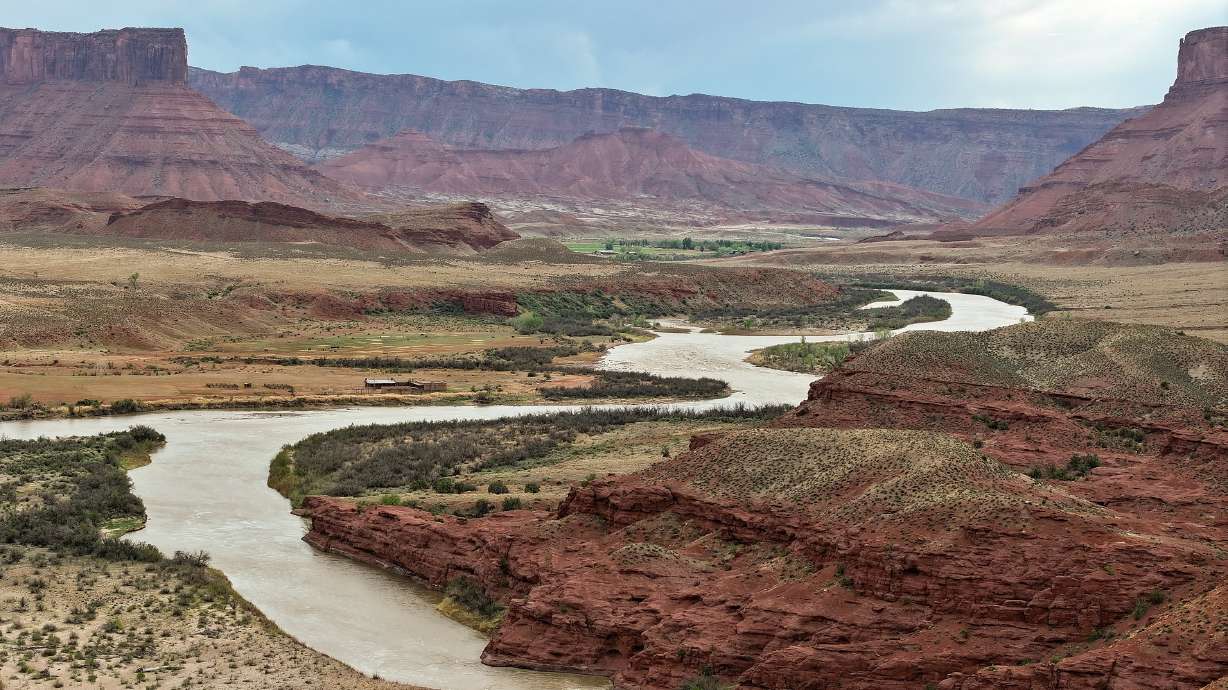Estimated read time: 4-5 minutes
This archived news story is available only for your personal, non-commercial use. Information in the story may be outdated or superseded by additional information. Reading or replaying the story in its archived form does not constitute a republication of the story.
SALT LAKE CITY — Salinity in the Colorado River is a huge problem and threatens to impact seven states, 30 Native American tribes and Mexico because all those entities share this finite resource that flows for more than 1,400 miles, provides water for 40 million people and irrigates 5 million acres of farmland.
To that end, Rep. John Curtis, R-Utah, presented his bill, the Colorado River Salinity Fix Act, during a Natural Resources Subcommittee on Water, Wildlife and Fisheries hearing earlier this month. The legislation addresses the excessive salinity levels in the Colorado River, which have significant environmental and economic impacts on Utah and other Western states.
"Excessive salt in our rivers can damage Utah's iconic national parks, limit available drinking water and affect the water ranchers use to feed the nation," Curtis said. "This bill is essential for maintaining the Colorado River's health and utility, ensuring it continues to support our communities and economy."
In a congressional hearing, Curtis explained the problem.
"You all know in the West we're blessed with amazing public lands and resources. However, excessive salt in our rivers can damage sites in Utah's iconic national parks, limit available drinking water in a rapidly growing state and tarnish the water that ranchers used to feed the rest of the country," he said.
He stressed that it is a problem of historic proportions.
"Ancient seas that once covered much of the Intermountain West left significant saline rock formations. When water contacts these formations, it dissolves and salt discharges into the Colorado River and its tributaries, thereby elevating the river's salinity," Curtis said. "This causes environmental damage and hundreds of millions of dollars in economic losses each year for water users."
The bill aims to enhance the existing Salinity Control Program, which has successfully reduced salt levels in the Colorado River for nearly 50 years. Curtis' office said by implementing innovative solutions and fostering partnerships, such as those seen in the Washington County Water Conservation District, the legislation will help manage salinity and make millions of gallons of water more usable.
Excessive salt in our rivers can damage Utah's iconic national parks, limit available drinking water and affect the water ranchers use to feed the nation.
–Rep. John Curtis, R-Utah
Zach Renstrom, general manager of the Washington County Water Conservancy District, said the move to extend the Colorado River Salinity Control Act will help in a vital project. The district has partnered with the U.S. Bureau of Reclamation to remove salt from nearby Pah Tempe Springs, the second-highest salinity contributor in the entire river.
"If proven feasible, this project will add significant new supplies to our local water resources while removing an environmentally harmful toxin from the river," Renstrom said.
Amy Hass, executive director of the Colorado River Authority of Utah, released a statement that said current challenges demand more action.
"For the past five decades the state of Utah has benefitted from enhanced water quality resulting from the Salinity Control Program. While mechanisms established by Congress to fund the program worked well initially, years of extreme drought on the Colorado River and diminished hydropower revenues require a fix to the funding structure. Utah supports HR7872 in order to support the long-term sustainability of the program."
Don Barnett, executive director of the Colorado River Basin Salinity Control Forum, said it is vital to keep up these efforts.
He pointed to the Pah Tempe Springs as an example of why the work needs to continue.
"The spring produces approximately 5,000 gallons of water per minute or more than 7 million gallons daily. The springs released and it's astonishing — 109,000 tons of salt. Think about that. That is 6,813 semitruck loads of salt annually. The springs' high salinity limits use and poses unique challenges to regional and local water supply," he told committee members.
As far as the salinity problem, it is one issue the seven basin states have coalesced around, which is a rare thing when it comes to water, Barnett said.
"I'd say that 50 years ago, the seven Colorado River Basin States came together and said this is a basinwide issue. We're going to work together and we're going to cooperatively solve the water quality issue. And therefore, despite the fact that there's an awful lot of pressure and tension on the river itself, water quality itself has remained something that the states have worked unitedly on."
Barnett was blunt when he addressed the urgency of Congress passing the changes to the Salinity Control Act and if it fails.
"It will be a disaster."









